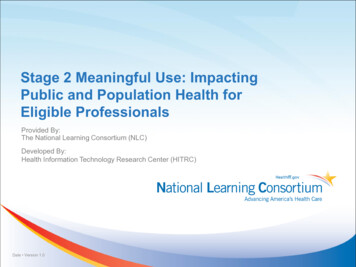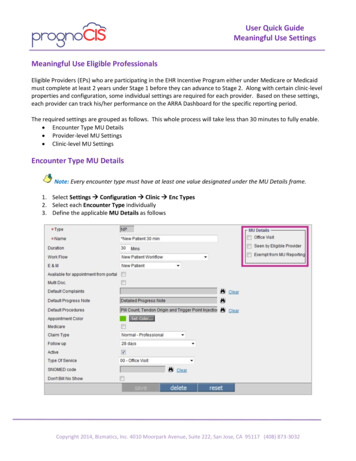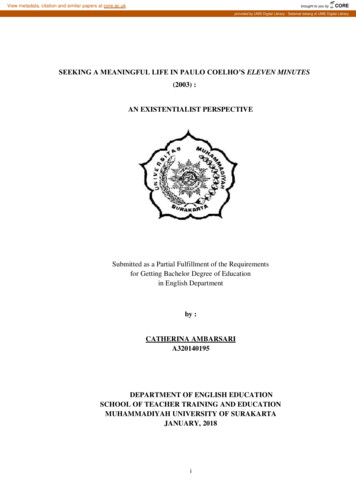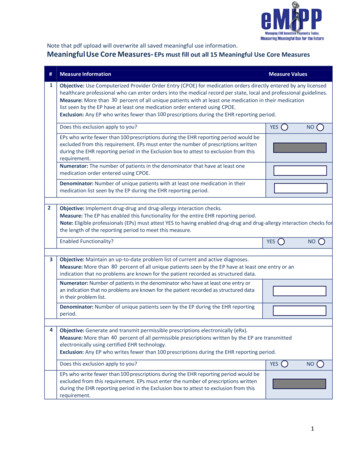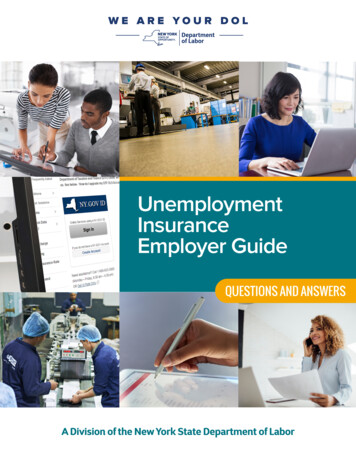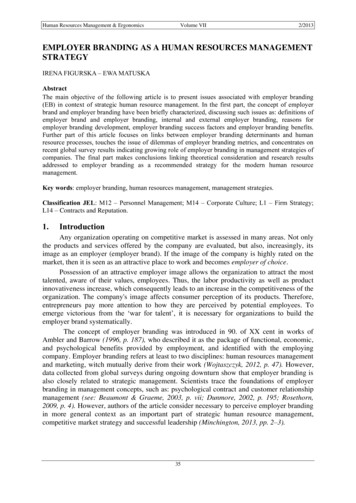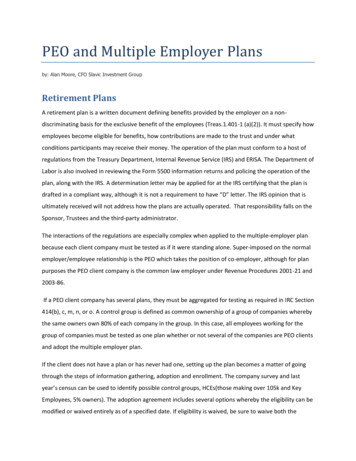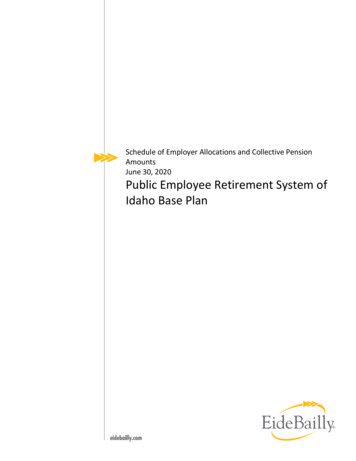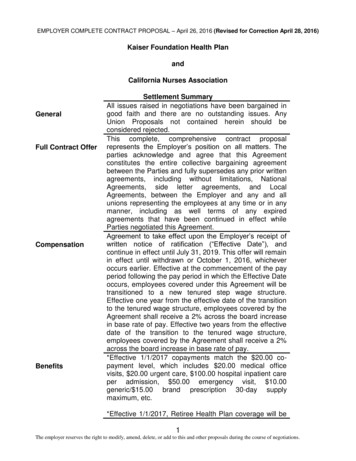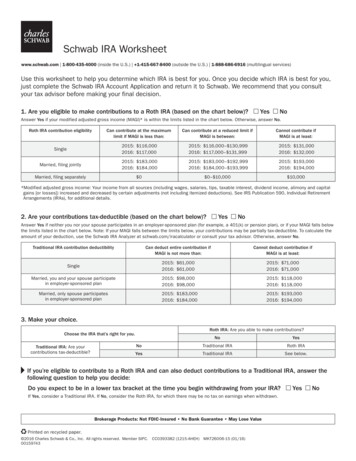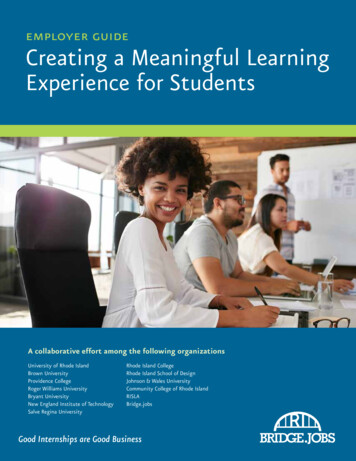
Transcription
employer guideCreating a Meaningful LearningExperience for StudentsA collaborative effort among the following organizationsUniversity of Rhode IslandBrown UniversityProvidence CollegeRoger Williams UniversityBryant UniversityNew England Institute of TechnologySalve Regina UniversityRhode Island CollegeRhode Island School of DesignJohnson & Wales UniversityCommunity College of Rhode IslandRISLABridge.jobsGood Internships are Good Business
Thank you for your interest in supervising and mentoring an intern. Yourparticipation provides interns the opportunity for both personal andprofessional growth. Interns and volunteers have been commended fortheir diligence, work ethic, and professionalism. We are confident that youwill find them a welcomed addition to your staff. Please take a momentto review this guide and learn more about expectations for working withinterns. Representatives from experiential and career offices in everyRhode Island institution of higher education have come together to createthis guide to outline the basic fundamentals involved in designing aninternship, and illustrate the benefits of investing in experiential learning.A collaborative effort among the following organizations
Table of ContentsCreating a Mutually Beneficial Relationship2-13What is the Best Experiential Option for Your Organization?2A Closer Look at an Intern3A Closer Look at a Volunteer 3How do Employers and Students Benefit from Internships3Finding the Right Intern for Your Organization4Considerations for International Students 4Designing Your Internship Program 5Role of an Internship Supervisor 5Writing an Internship Posting Description6Posting Your Internship Online 6Making an Internship Offer 7The Role of the Career Center7RI Work Immersion Program 8Paying an Intern 9Unpaid as Defined by the Department of Labor9Other Forms of Benefits9Onboarding Your Intern 10The Stages of an Internship 11Retaining Talent in the State of Rhode Island11Insurance Considerations 12Loan Forgiveness for Internships 12Mid Term and Final Evaluation 13Conclusion 13Common Internship Legal Questions14-15Sample Internship Descriptions & Learning Contracts17-28Communications/Editorial Internship Description 18Psychology Internship Description 19Engineering Internship Description 20Design Internship Description 21Marketing Internship Description 22Public Relations Internship Description 23Learning Contract: Sample Worksheet 24Learning Contract: Education 25Learning Contract: Events 26Learning Contract: STEM 27Learning Contract: Environmental Science 28Career Center Websites 291
Creating a Mutually Beneficial RelationshipThe rise in global competition for a talented and innovative workforce brings opportunities for Rhode Island employers togain a competitive edge.What is the Best Experiential Option for Your Organization?Experiential learning provides students with direct experience through which they can use analytical skills and reflectionto apply new ideas gained from the experience to their classroom learning. Experiential learning includes internships,service learning, and various practicum opportunities. Determine what the best fit for the organization is by consideringthe following definitions:»» Internships are defined by the National Association of Colleges and Employers (NACE) as: “a form of experientiallearning that integrates knowledge and theory learned in the classroom with practical application and skillsdevelopment in a professional setting. Internships give students the opportunity to gain valuable appliedexperience and make connections in professional fields they are considering for career paths; and give employersthe opportunity to guide and evaluate talent.” In addition, an internship is a semester (fall, spring, summer) induration, may or may not carry credit, may be paid or unpaid based on the Department of Labor criteria. (See Page9 for DOL Requirements)»» Student Employee is a person who is hired to provide services to an organization on a regular basis inexchange for compensation, not for academic credit. (See Page 9)»» Capstone/Project Based Learning course is the culmination of learning in the major. A student generallyworks on a single large project--such as a thesis paper or large research project--for the entire semester.»» Volunteer is a person who performs a service willingly, without pay or credit in order to support a cause, usuallythrough a non-profit organization.»» Service Learning is curriculum-based emphasizing hands-on learning while addressing real world concerns. Theservice experience provides a context for translating discipline based theories into practice.»» Civic Engagement offers a broad concept of community involvement and awareness that can includeservice, advocacy, service learning, volunteerism, and political participation, with the goal of helping to developcommunity based knowledge, values and skills.»» Externships (Job Shadow) provide an initial exposure to a career for a brief period of time (such as one day,a week, or a couple hours per week) by having students “shadow” an experienced employee or professional.Externships may include academic credit when connected to a course.2
A closer look at an InternOften times an internship is the ideal fit for an individual andemployer. An internship is any carefully monitored meaningfullearning experience in which an individual has intentionalprofessional goals and reflects actively on what he or she isaccomplishing throughout the experience. Developing an internshipprogram is an excellent strategy for investing in your organization’sfuture successes, often leading to discovering future colleagues andleaders.A typical internship: Includes developing intentional learning objective goals that arestructured into the experience and supervised by a professionalwith relevant and related background in the field Promotes academic, career and/or personal development Includes learning objectives, observation, reflection, andevaluation Balances the intern’s learning goals with the organization’s needs Typically lasts three months May be part-time or full-time Involves industry related and soft skill development May be carefully monitored and evaluated for academic credit Provides adequate supervision in a reasonably safe environmentwith the necessary tools to perform the learning goals agreed uponfor the duration of the internship Includes a designated and insured office spaceAn internship is NOT: Unpaid or unsupervised labor Meant to replace an employee More than 20% busy work (filing, covering phone, errands)How Do Employers &Students Benefit fromInternships?It is important to note that students shouldbe the primary beneficiaries of internships,meaning that they are expecting a meaningfullearning experience. One of the more significantadvantages to providing internships is theopportunity to select and develop your futuretalent. You have the opportunity to evaluate andscreen potential employees prior to making afull-time position offer, which leads to financialsavings. Employers have reported convertingmore than half of eligible interns into full-timehires. If hired in a permanent position, previousinterns assimilate faster to their new roles andhave shorter learning curves than external hires.BenefitsEmployerProvide freedom for professional staff to pursue creative ormore advanced projects and increase staff retention rate.Allow staff to learn about mentoring as aprofessional development point.Interns can assist an organization in application ofthe latest strategies and techniques in the field.Maintain connections with colleges and increase visibilityon campus. Recruit other students and generate enthusiasmwhile creating awareness of the field for future hires.Promote community involvement by teaching the prospectivework force. This can be an excellent public relations tool.Be sure to check with your corresponding institution for specific guidelines.A closer look at a VolunteerA volunteer might be the best fit for your organization if you arelooking for one time assistance at an event or program or if you needa few hours per week of service (unless agreed upon, volunteeringis typically limited to 3 – 12 hours per week). Unlike an internship,the focus of a volunteer position is primarily on the service beingcompleted and the individual or issue receiving that service. Aninternship will primarily focus on the learning experience of thestudent and the benefits to the organization/employer are secondary.Service Learning is a balance between the two with equal focus onlearning, service and benefits to recipients and providers.StudentEnsure the assignment of challenging projects andtasks while receiving real life experience.Provide projects that complement academicprograms and/or career interests.Broad exposure to the organization (remember: this is a chancefor them to personally develop and explore career possibilities.)Demonstrate industry relevance and an opportunityto create a professional network.3
Finding the Right Intern forYour Organization»» High School: The benefit of incorporating high schoolstudents into your organization is so they can developnew skills. These skills will allow them to discover whatareas they excel in, and they could potentially remain withthe organization through college. This experience can alsoincrease the student’s desire to graduate and pursue highereducation in the future.»» Undergraduate: An undergraduate intern could bebeneficial for your organization because of their experiencein and out of the classroom. They have an opportunityto apply things they’ve learned in their undergraduatecurriculum into the workplace. Many freshmen andsophomores seek out internships to explore careers in afield in which they have an interest. Juniors and seniors arelooking to develop their professional career skills. They willgain more work experience, which could result in full-timeemployment.»» Post-baccalaureate: First professional position priorto moving into a career. This can also be used as anopportunity to hone in on skills as a recent graduate.»» Graduate: Since these students have already received anundergraduate degree, as a graduate student intern theyare advancing their professional career development whilealso determining their career niche. These students wanteven more work experience to advance their skills and alsopotentially transition into full-time employees.»» Career Changer/Adult Learner: Adult learners aretransitioning to a new industry and hoping to expand theirprofessional network and incorporate their professional skillsinto your organization.4Considerations forInternational StudentsThese are typically undergraduate orgraduate students. There is no excessivepaperwork needed to hire an internationalintern. International students do not needa green card to intern nor an EmploymentAuthorization Document/EAD. Federalregulations permit eligible F-1 or J-1 visastudents maintaining valid status to intern intheir major field of study with permission fromthe Office of International Students & Scholars.The application process for internationalinterns includes:1. The student’s academic advisor or Dean/Chairman of the department must endorse/sign the Curricular Practical Training Form(F-1) or Academic Training Certification Form(J-1)2. The student must submit an original joboffer letter, on company letterhead, thatincludes the following information (no faxesor e-mails will be accepted):a. Name of companyb. Location of the internship(curricular practical training/CPTor academic training/AT)c. Salary information (optional)d. Number of hours per week (not toexceed 20 hours while school is insession)e. Beginning and ending dates of thetraining3. Student must submit all of the abovedocuments for approval to the Office ofInternational Students and Scholars (OISS)before commencing an internship period
Designing Your Internship ProgramPrior to hiring an intern, an employer must understand how interns will fit within the company’s goals and culture. Sinceorganizations vary in age, size, industry, and product, so too will internship activities.Questions that may determine what kind of program will work best for you: What does your organization hope to gain from the program? Is your organization looking to fulfill a need on a specific project? Will this internship(s) encompass one majorproject, or entail a variety of small projects? What are the tools and workspace necessary to provide the student? What talents, academic background, and experience do you want in an intern? Decide on qualifications early onto help you select the best candidate. Who will be primarily responsible for the intern(s)? Will that person be a mentor, supervisor, or both?»»Learn about prospective interns: Whether a high school student, college student or adult learner, they want todevelop skills. The best way to know what skills an intern is hoping to gain is to interview.»»It is important that employers realize that school and classes must remain a top priority forinterns if they are a current student. The internship position should enhance their learning experience.Understand that for most interns this is a new experience and they may need support in balancing their schoolwork andinternship. Agreeing on a set number of hours interns will work each week and offering flex-time for freedom to plantheir schedules on a weekly basis are two ways to support balance.»»Required hours/credit may vary by school but most interns typically complete 10-20 hoursper week. The student intern should meet with an academic or internship advisor for furtherdirection.Best Practice: Internship MentorsIn addition to the supervisor, a mentor may assist with transition intothis new learning environment. This is done by answering generalquestions related to personal and professional growth, and sharingcareer knowledge leading to networking in the field.Role of an Internship SupervisorIt’s going to be important to identify a supervisor for your intern(s) who will familiarize them with the organization,provide assignments and serve as a “contact” person for questions. It’s recommended that the intern supervisor be an expertin the type of work the intern(s) will be performing to provide the appropriate guidance for the intern’s assignments. Anintern supervisor’s responsibilities will include: Taking part in an intern’s application, screening, and interview processConducting intern orientationDeveloping learning goalsMeeting with an intern regularly to evaluate performance and if goals are being met; and assessing the internshipprogram’s success Working closely with the corresponding college (See Page 29)5
Writing an Internship PostingDescriptionEmployers are competing to gain a student’s interest and stand out amongthe rest. When writing your posting, treat the description as an opportunityto showcase the internship. If you want to attract the best candidate, besure your description is as honest and accurate as possible, including the fullscope of the job and responsibilities. (See Pages 18 - 23)Questions to consider before writing the positiondescription:The essential componentsof an effective internshipdescription include: Explain the organization’s goals andmission Why will students want to apply for your opportunity overothers in the industry? Does your opportunity illustrate how it will be a uniqueexperience? Do you fully define the benefits and incentives yourorganization can provide?Writing an internship description is essential to recruiting the rightindividual. Write the description in clear, everyday language that will helpthe student understand the position and your organization culture. If theopportunity offers a broad exposure to many elements in your organization,be sure to state that in the description. Interns need to know accurateexpectations upfront. Outline the intern’s responsibilities andpotential tasks/projects Describe skills that will bedeveloped Illustrate the necessary qualifications Skills (computer, analytical, design,communications, etc.) Education level (year, GPA, etc.) Majors Clarify the duration of the internship Hours required per week Flexibility with schedule or specifichours Type: summer, semester, etc. Note if paid or unpaid (See Page 9) Specify how to apply - provide contactinformation6Posting Your Internship OnlineMany campus career centers have databases that allow employers to postjob/internship opportunities for free. You can visit their sites for instructionin addition to posting on bridge.jobs. Keep in mind that the timing of yourpost is crucial and should take into consideration the academic calendar ofyour corresponding institution (see Page 29 for career center websites).Bridge.jobs: Bridge.jobs is a program that focuses on connectingemployers and students in Rhode Island. The goal of Bridge.jobs is toconnect Rhode Island employers with talented students looking to gainvaluable professional experience. The Bridge.jobs website (www.bridge.jobs) allows employers to post paid or unpaid internships online and directlyreach out to a vast and talented pool of individuals.If you have any questions about this program or if you need any assistance,please feel free to contact:Adrian van AlphenDirector Employer and University RelationsRI Student Loan Authority, 935 Jefferson Blvd, Suite 3000, Warwick, RI 02886avanalphen@risla.com Office Phone: 401-468-1796 Fax: 401-468-2106
What happens after youpost? It is not unusual to not get applicants You may have to consider your timing, wording,and target audienceThe Role of theCareer CenterThe Career Center is well-equipped toprovide assistance in the internshipprocess on any of the following: You can get in touch with your correspondingcampus Career Center for assistance Making an Internship Offer When you feel you have found the candidate with theappropriate experience, professionalism, maturity, andwho is a mutually beneficial fit for the organization,make an offer. Just as in a permanent full-time jobsearch, students may be applying and interviewingfor internships with multiple organizations. Thus, it isbest to make an offer as soon as a decision has beenmade. At this time, a work schedule should be set,compensation agreed upon, and appropriate paperworkcompleted for human resources and the student’sinternship requirements. Upon acceptance of the offer,remove your internship from all places where it isposted (e.g., college/university web sites) to preventfurther applications. Framing job postings to attract potential internsProviding guidance on what to expect from an internProviding guidance on supervision and mentoring tosupport student intern growthDetermining if the planned internship provides ameaningful learning experienceEvaluating and assessing of the internship experienceIntegrating your feedback into future internshipproceduresThe Career Center will NOT: Provide you with a “match” for your internshipposition While we do assist students with theirinternship search, the search is guided by theirinterests and pursued by the studentProvide you with an employee The student is coming to you to learn anindustry in which they may want to work The Career Center does not provide the studenttraining for your industry7
RI Work Immersion ProgramThe Governor’s Workforce Board operates the Work Immersion Program for Rhode Island resident college students orrecent college graduates (within 6 months) attending colleges and universities in or outside of Rhode Island. The programprovides a 50% wage reimbursement to RI businesses that provide a qualifying paid internship. Qualifying internships arethose that either provide credit or are endorsed by the intern’s college or university as a “meaningful learning experience.”All internships must be aligned with the students’ major/career goals. The internship must pay no less than minimum wage(currently 9.60) and no more than 20.00 per hour, and must be at least 45 hours up to a maximum of 400 hours induration for no longer than 20 weeks in duration.Once a student has completed 400 hours of interning (combined), a business is no longer eligible to receive the subsidy forher or his internship.For more information on how to apply for the Work Immersion Program, visit gwb.ri.gov/grow-future-talent.8
Paying an Intern Wages for most internship opportunities are usually determined before the intern is hiredConsider paying consistent wages to all interns within each departmentStudents in technical fields are generally paid more than nontechnical fieldsPay for interns often varies by location, type of industry, size of organization, etc.An internship needs to adhere to a W-2, NOT a 1099Unpaid as Defined by the Department of LaborIf you are deciding between paid and unpaid internships, it is important to know if the U.S. Fair Labor Standards Actapplies to your organization.The U.S. Fair Labor Standards Act restricts an employer’s use of unpaid interns. This Act applies to businesses that havetwo or more employees directly engaged in interstate commerce as well as annual sales of 500,000 or more. Interns whoqualify as trainees do not have to be paid. If you find you cannot pay your intern, you must meet these seven criteria fordetermining trainee status (as determined by the U.S. Department of Labor). The intern is the primary beneficiary basedon the extent to which:1. The intern and the employer clearly understand that there is no expectation of compensation. Any promise ofcompensation, express or implied, suggests that the intern is an employee - and vice versa.2. The internship provides training that would be similar to that which would be given in an educationalenvironment, including the clinical and other hands-on training provided by educational institutions.3. The internship is tied to the intern’s formal education program by integrated coursework or the receipt ofacademic credit.4. The internship accommodates the intern’s academic commitments by corresponding to the academic calendar.5. The internship’s duration is limited to the period in which the internship provides the intern with beneficiallearning.6. The intern’s work compliments, rather than displaces, the work of paid employees while providing significanteducational benefits to the intern.7. The intern and the employer understand that the internship is conducted without entitlement to a paid job at theconclusion of the internship.(See Common Legal Questions about Interns; See Page 14 - 15)Other Forms of BenefitsOffering benefits may provide incentives for talented students to accept one internship position over another or increasethe intern’s commitment during the experience. Transportation assistanceScholarshipsHousing assistance for those who relocateProfessional development networking eventsTime worked as an intern can accumulate and apply toward benefits if turned into a full-time employee after graduationPaid holidays (if already receiving compensation)Tuition reimbursement9
Onboarding Your InternFamiliarize your intern with the company,work site, and culture of your organization.It is very important that interns be warmlywelcomed and introduced throughout yourorganization, just as you would welcome a new fulltime employee. Not only are interns new to yourorganization, in many cases, they are new to theprofessional world of work.If affiliated with a school: Many studentsare unfamiliar with the activities, environment,and objectives of your organization. Even thoughyour interns may have worked part-time to supporttheir education, these experiences may not haveexposed them to organizational politics, the needfor confidentiality, the importance of teamwork, orthe profit-making nature of business. It is duringthe orientation and training that these issues andinformation about the organization are addressed.The sooner your intern understands yourorganization and how it operates, the sooner heor she can assume assigned responsibilities andcontribute. Expectations can vary based on thesize of your organization, but in general, be sure toreview: 10Overall responsibilitiesHoursDress codeHow to cope with absenteeismSafety regulations and requirementsLunch hour policyAbsenteeism policyCell phone/social media policiesConfidentiality agreementHow you prefer to be reached/communicationpreferences (e.g., email, phone)Learning GoalsAt the start of the internship, it is recommended thatthe supervisor and intern create a list of learning goalsthe intern hopes to complete. The learning goals serve asthe academic and professional road map for the intern’ssemester with your organization. This activity helps toclearly identify the intern’s learning objectives and howthe intern plans to accomplish them. Creating thesegoals is also an opportune time to discuss work placerequirements, intern responsibilities, and hours expectedto complete (to earn credit). We ask our supervisors totake the time to meet with the interns during the firstweek of the internship to discuss and negotiate learninggoals. (See Pages 24 - 28)
Best Practice: RetainingTalent in the State ofRhode IslandThere are many ways to make the internship bothmemorable and engaging for both the intern andemployer. Here are some examples of ways to enrichan internship experience:»»Social Activities: Whether it is employees andThe Stages of an InternshipAdapted from: Sweitzer, H.F., & King, M.A. (2013). The Successfulinternship, personal, professional, and civic development. Belmont, CA:Brooks/Cole Cengage Learning.A powerful framework for professional development during aninternship is described in the Switzer and King (2013) stagesof the internship model. Their four developmental stages ofthe internship (anticipation, exploration, competence, andculmination) provide a structure for examining professional growththat occurs within the time frame of an internship. As a bestpractice, supervisors can serve as mentors by engaging internsin understanding their work environment through active andconsistent dialogue and collaboration.»»Anticipation involves overcoming anxieties, getting to knowcolleagues and clients, constructing individual learning goals,understanding the organizational culture of this learningenvironment, and becoming familiar with the purpose andmission of the agency.»»Exploration challenges a student to adjust expectations withself, with others, with organizational values, and to identifyproblem areas requiring attention. Students question theadequacy of their existing skills and knowledge in relation totheir responsibilities in this new learning environment.interns going out to lunch, or employees takinginterns to a local baseball game, engaging in theseactivities provides a great opportunity to get toknow one another on a more personal level. Theyalso provide interns a chance to get to know otherinterns and employees with whom they havenot worked. Many Rhode Island employers withsuccessful internship programs state that theirsocial activities are rated by interns as one of thetop highlights of their experience.»»Participation in Volunteer/CommunityService Days: A great way to show interns thevalues of your organization is to provide a time forthem to talk to other employees. Include internsin any community service or volunteer days yourorganization has planned. They will get to meetmore employees and participate in a good cause,they will be able to see your company’s dedicationto service – an important value among themillennial generation.»»Professional Development Activities:Allow interns to develop their professional skillsby allowing them to sit in on meetings and workwith employees in other departments for a day.Provide opportunities for interns to attend careerdevelopment events/seminars in the community tolearn new skills.»»Competence is transformative, as the student feels empowered,accomplishes worthwhile tasks, and seeks quality projects. Inthis stage, students are more connected to the social learningenvironment, feel more self aware, and confident professionally.»»Culmination requires students to evaluate their performance,identify transferable skills, and engage in closure with colleaguesand clients before concluding the experience.1111
Loan Forgivenessfor InternshipsRhode Island Student Loan Authority(RISLA) has launched a rewards program toencourage students to pursue internships.This program will help reduce student loanindebtedness and help offset the fee thatsome students may incur to obtain creditfor internships. Loan forgiveness will beawarded to qualifying borrowers on anynon-federal loan held by RISLA. In orderto receive loan forgiveness, the studentmust complete an internship through aninstitution of higher education. Eligibleinternships are only those for which thestudent is earning a minimum of threecredit hours. To be eligible, the studentmust attend a RI institution of highereducation or be a RI resident, and theymust have a non-federal loan with RISLA.Internship requirements include: Internship must be after May 1, 2013 Internship must be located in RhodeIsland or out-of-state Internship must be 3-credits and ontranscript, validated by an institutionof higher education Student graduates from their degree/certificate programTo apply: Download the application andview full eligibility requirements at ce ConsiderationsEmployers, interns, parents, and colleges/universitiesshould be aware of insurance considerations: Accident/liability insurance: provided by the intern/parent/guardian (some organizations may require the school to provideliability insurance) General liability insurance: provided by the intern/parent/guard
Learning Contract: Education 25 Learning Contract: Events 26 Learning Contract: STEM 27 Learning Contract: Environmental Science 28 Career Center Websites 29. 2 The rise in global competition for a talented and innovative workforce brings opportunities for Rhode Island employers to . Rhode Island School of Design web.uri.edu/career .

